Ovarian Cancers: Evolving Paradigms in Research and Care
IDENTIFYING PRIORITIES FOR RESEARCHERS
Despite recent promising advances in cancer research, there are still surprising gaps in the fundamental knowledge about ovarian cancer. Limitations in our understanding about the biology of the disease—and gaps in the evidence base to support diagnosis, delivery of care, and survivorship—impede efforts to improve the prevention, early detection, treatment, and ongoing care for women with ovarian cancer.
Ovarian cancer is relatively uncommon, yet it is one of the deadliest cancers. Each year in the United States, more than 21,000 women are diagnosed with ovarian cancer, and more
than 14,000 women die from the disease. Late diagnosis and a high recurrence rate contribute to the high mortality rate.
The Centers for Disease Control and Prevention (CDC) asked the National Academies of Sciences, Engineering, and Medicine to convene an expert committee to examine the state of the science in ovarian cancer research, identify major knowledge gaps about the biology and treatment of ovarian cancer, and consider opportunities to advance the research. Learn more on the next page.

The congressionally mandated report, Ovarian Cancers: Evolving Paradigms in Research and Care, makes recommendations to reduce the incidence of ovarian cancer and to lessen the morbidity and mortality from the disease. Specifically, the committee highlights promising research themes that could advance ovarian cancer risk prediction, prevention, early detection, comprehensive care, and cure.
Overview of Research Priorities
There are many unanswered questions about ovarian cancers and how best to diagnose and treat these cancers. This has impeded progress in the prevention, early detection, treatment, and management of ovarian cancers. The committee concluded that the failure to reduce morbidity and mortality from ovarian cancers during the past several decades is likely due to several factors, including:
- A lack of research focusing on the subtypes of ovarian cancer
- An incomplete understanding of the risk factors for ovarian cancer
- Lack of validated and effective screening and early detection tools
- Variation in the delivery of care for women with ovarian cancer
- A lack of precision medicine approaches to address the heterogeneity of ovarian cancer
- Lack of research on survivorship, including supportive care and long-term management of the disease.
The committee highlighted research gaps that, if addressed, could have the greatest impact on reducing ovarian cancer morbidity or mortality. Four overarching concepts were identified to improve the evidence base for ovarian cancer:
- As the most common and lethal subtype, the study of high grade serous carcinoma needs to be given priority;
- More subtype-specific research is also needed to further define the differences among the various subtypes;
- Collaborative research (including the pooling and sharing of data and biospecimen resources, such as through consortia) is essential; and
- Key to progress in ovarian cancer research is the dissemination and broad implementation of new knowledge and evidence-based practices.
Conceptual Model of Research Gaps Across Continuum of Ovarian Cancer Care
To guide its process, the committee developed a conceptual model to identify research gaps and critical areas of cross-cutting research. The committee concluded that research is needed throughout the ovarian cancer care continuum, and emphasized several key cross-cutting research efforts.

The Biology of Ovarian Cancer
“Ovarian cancer” is a generic term used for any primary malignant tumor of the ovary. However, the term does not reflect the complexity of the disease. Ovarian cancer research is complicated by the significant degree of heterogeneity within and between subtypes, yet clinicians and researchers tend to combine them in many types of research. In spite of recent advances, the incomplete understanding of the basic biology of each subtype, including cellular origins and disease pathogenesis, impedes advances in prevention, screening and early detection, diagnosis, treatment, and supportive care.
The ovaries are made up of a variety of cell types, and ovarian cancer can arise from any of these cells. However, more than 85 percent of ovarian cancers are classified as ovarian cancers with epithelial differentiation (or ovarian carcinomas), and most ovarian cancer–related deaths are due to ovarian carcinomas. Ovarian carcinomas include several different subtypes, each with different origins, risk factors, genetic mutations, biological behaviors, and prognoses. The most common subtype is high-grade serous carcinoma, which is also the most lethal.
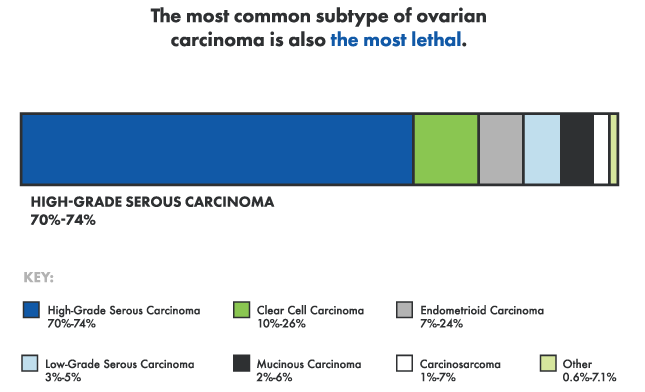
In addition, recent evidence suggests that many cancers previously thought to originate in the ovaries actually arise in other tissues, such as the fallopian tubes, and then metastasize to the ovaries.
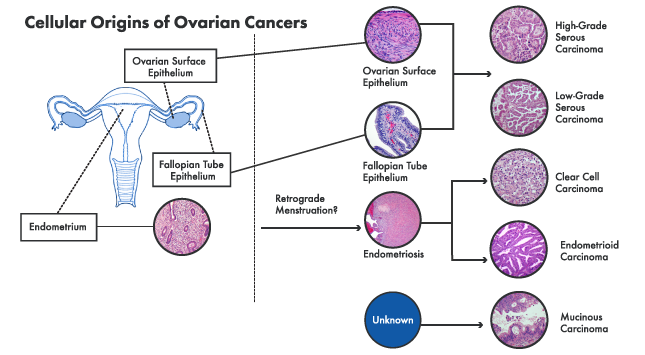
Gaps in the understanding of ovarian cancer biology have prevented the emergence of uniform standards for describing the characteristics of ovarian cancer subtypes. The implementation of a single, uniformly applied nomenclature and classification scheme with standardized diagnostic criteria is essential and would serve as the necessary foundation for all future research in ovarian cancer. Achieving this consensus will be complex and will require the efforts of multiple stakeholders engaged in an iterative process.
RECOMMENDATION 1: Researchers and funding organizations should design and prioritize preclinical, clinical, and population-based research agendas that take into account the different ovarian cancer subtypes. A top priority should be elucidating the cellular origins and pathogenesis of each subtype. Particular attention should be paid to:
- Tumor characteristics such as microenvironment, intratumoral heterogeneity, and progression pathways;
- The development of experimental model systems that reflect ovarian cancer heterogeneity; and
- Incorporation of the multi-subtype paradigm into prevention, screening, diagnosis, and treatment research.
RECOMMENDATION 2: Pathology organizations, oncology professional groups, and ovarian cancer researchers should reach consensus on diagnostic criteria, nomenclature, and classification schemes that reflect the morphological and molecular heterogeneity of ovarian cancers, and they should promote the universal adoption of a standardized taxonomy.
Risk Assessment and Early Detection
While there are several established risk factors for ovarian cancers as a whole, much remains to be learned about risk factors, risk assessment, risk reduction, and early detection strategies for ovarian cancers.
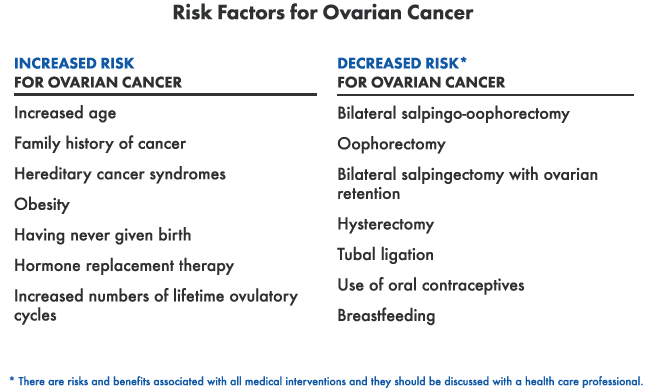
Several factors are associated with either an increased or decreased risk for developing ovarian cancer. These patterns of association are inconsistent and can vary among ovarian cancer subtypes. A family history of ovarian cancer and certain genetic mutations and hereditary cancer syndromes have strong associations with risk for ovarian cancer. Genetic counseling and testing are recommended for all women with an invasive ovarian cancer. First-degree relatives (parents, siblings, and children) of women with ovarian cancer should also seek genetic counseling to determine whether genetic testing is warranted.
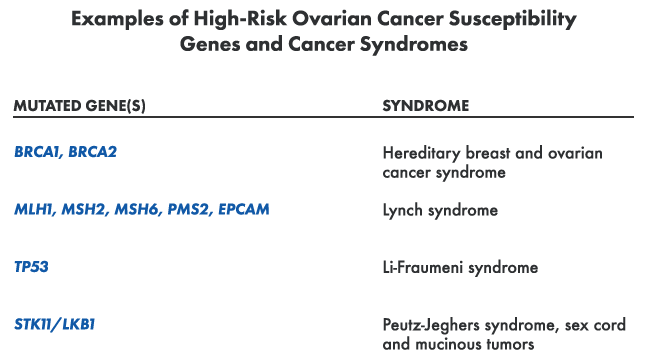
Better methods for identifying women at high risk of developing ovarian cancer could facilitate efforts to improve risk reduction. Research is needed to evaluate the importance of specific known risk factors, and to identify potential new risk factors.
Research is also needed to improve early detection of the disease. Currently, there is no accurate and reliable test to screen asymptomatic women for early ovarian cancer. Some methods that have been evaluated for early detection of ovarian cancers, including biomarker tests and imaging technologies, have been shown to detect more ovarian cancers at earlier stages of the disease. However, these methods also have high false positive rates, and to date these approaches have not demonstrated a significant impact on mortality from ovarian cancer. While research on refining these methods of early detection may be fruitful, distinct multimodal approaches will likely be needed to detect each of the various ovarian cancer subtypes at its earliest stages.
Evaluation of specific risk reduction strategies is warranted to better understand the risk–benefit ratios of these interventions for different ovarian cancer subtypes and for specific at-risk populations.
Potential medical interventions for risk reduction include :
- Bilateral Salpingo-Oophorectomy
- Oophrectomy
- Bilateral Salpingectomy with Ovarian Retention
- Hysterectomy
- Tubal ligation
- Oral contraceptives
RECOMMENDATION 3: Researchers, public health practitioners, and clinicians should develop and implement innovative strategies to increase genetic counseling and testing, as well as cascade testing for known germline genetic predispositions in appropriate populations (e.g., untested ovarian cancer survivors and relatives of individuals who tested positive). Furthermore, researchers, clinicians, and commercial laboratories should determine the analytic performance and clinical utility of testing for other germline mutations beyond BRCA1 and BRCA2 and the mismatch repair genes associated with Lynch syndrome.
RECOMMENDATION 4: Researchers and funding organizations should identify and evaluate the underlying mechanisms of both new and established risk factors for ovarian cancers in order to develop and validate a dynamic risk assessment tool accounting for the various ovarian cancer subtypes. Furthermore, a spectrum of risk factors should be considered, including genetics, hormonal and other biological markers, behavioral and social factors, and environmental exposures.
RECOMMENDATION 5: Clinicians, researchers, and funding organizations should focus on quantifying the risk–benefit balance of nonsurgical and surgical prevention strategies for specific subtypes and at-risk populations.
RECOMMENDATION 6: Researchers and funding organizations should focus on the development and assessment of early detection strategies that extend beyond current imaging modalities and biomarkers and that reflect the pathobiology of each ovarian cancer subtype.
Diagnosis and Treatment
Several medical professional groups have established guidelines for the initial assessment, referral, and treatment of women with suspected ovarian cancer.
The diagnosis of ovarian cancer can be challenging, because the symptoms of the disease often mimic common, nonspecific symptoms that can be associated with a variety of other health conditions. Symptoms of ovarian cancer include bloating, pelvic and abdominal pain, difficulty eating, and urinary symptoms. Improved awareness of the signs and symptoms of ovarian cancer among health care professionals and better communication of these signs and symptoms between health care professionals and patients is needed.
It is also crucial that women with suspected ovarian cancer be carefully examined to help determine appropriate clinical management. In addition to symptom recognition, the clinical presentation of ovarian cancer can also include detection of pelvic mass on exam, concerns raised with diagnostic testing, and incidental findings from a previous surgery, imaging test, or tissue biopsy. For women who have late stage ovarian cancer, diagnosis can also be challenging because it can mimic gastrointestinal tumors at initial presentation.
Components of the diagnostic workup can include:
- assessment of family history of breast or ovarian cancer
- abdominal/pelvic exam, imaging
- blood tests
- avoidance of needle aspiration in patients with presumed early-stage disease to prevent tumor rupture and spread.
Most women with newly diagnosed ovarian cancer undergo primary debulking surgery (PDS) to remove as much of the grossly visible tumor as possible (cytoreduction), as well as to make it possible to determine a specific diagnosis (e.g., subtype, staging). Survival is markedly better for women who have complete (or optimal) tumor resection, yet great variability exists in the extent of tumor resection. For women in whom an optimal resection is not thought to be feasible, or who are unable to undergo PDS due to comorbidities, neoadjuvant chemotherapy can reduce tumor size and facilitate subsequent resection. After surgery, women typically receive multiple cycles of chemotherapy. While the majority of women respond well to initial treatment, most will experience a recurrence of the disease, resulting in a cycle of repeated surgeries and additional rounds of chemotherapy.
Several organizations have developed national clinical practice guidelines for the treatment of women with both newly diagnosed and recurrent ovarian cancer. Women who receive care in accordance with these guidelines have considerably better outcomes (e.g. longer survival and fewer surgical complications). However, less than half of women with ovarian cancer receive care that adheres to these guidelines. The considerable variability in the quality of care provided to women with ovarian cancer nationwide is influenced by a number of factors. The two most significant predictors of receiving guideline-concordant ovarian cancer care are treatment provision by a gynecologic oncologist (versus a general gynecologist or general surgeon) and a high-volume treatment setting (versus a low-volume hospital or cancer center).
Factors that significantly predict that women will not receive care consistent with national guidelines include: advanced age at diagnosis, the presence of one or more treatment-limiting comorbidities, non-white race, and lower socioeconomic status. More research is needed to understand the barriers to receiving guideline-concordant care, as well as the use of quality metrics to help drive continuous quality improvement in the care that women with ovarian cancer receive.
The committee recommended the development of more effective treatments and treatment strategies for ovarian cancer, including both pharmacologic and nonpharmacological interventions (e.g., optimal type/timing of surgery). There is a need for more research and better application of precision medicine approaches to ovarian cancer treatment. Precision medicine enables selection of molecularly targeted treatments based on specific mutations found in a patient’s tumor. Further, there is a need for improved research on combination approaches for ovarian cancer treatment, as well as more information on recurrence, drug resistance, and predictors of response. Interdisciplinary teams may be helpful in producing efficient and information-rich clinical research in ovarian cancer.
RECOMMENDATION 7: To reduce disparities in health care delivery and outcomes, clinicians and researchers should investigate methods to ensure the consistent implementation of current standards of care (e.g., access to specialist care, surgical management, chemotherapy regimen and route of administration, and universal germline genetic testing for newly diagnosed women) that are linked to quality metrics.
RECOMMENDATION 8: Clinicians and researchers should focus on improving current treatment strategies, including
- The development and validation of comprehensive clinical, histopathologic, and molecular characterizations that better inform precision medicine approaches for women with newly diagnosed and recurrent disease;
- Advancement in the understanding of the mechanisms of recurrent and drug-resistant (e.g., platinum-resistant) disease and the development of a more informative classification system;
- The identification of predictors of response to therapy and nearterm indicators of efficacy; and
- The determination of the optimal type and timing of surgery in women newly diagnosed with ovarian cancer and of the efficacy of subsequent cytoreduction procedures for women with recurrent disease.
RECOMMENDATION 9: Researchers should develop more effective pharmacologic and nonpharmacologic therapies and combinations of therapies that take into account the unique biology and clinical course of ovarian cancer. These approaches should include
- Developing immunologic and molecularly driven treatment approaches specific to the different ovarian cancer subtypes;
- Identifying markers of therapeutic resistance and exceptional response; and
- Using interdisciplinary teams to design and conduct statistically efficient and information-rich clinical studies.
Supportive Care Along the Survivorship Trajectory
Supportive (or palliative) care be integrated throughout the ovarian cancer care trajectory, including concurrently with cancer-directed therapies, even when the goal of therapy is cure. Women with ovarian cancer can live for years, even with recurrent disease, and can enjoy substantial benefits from supportive care in terms of both symptom relief and life prolongation. Supportive care is especially important for women diagnosed with ovarian cancer because the majority these women do not fit neatly into the traditional definition of survivorship. Women with ovarian cancer experience survivorship as part of the long-term management of active disease.
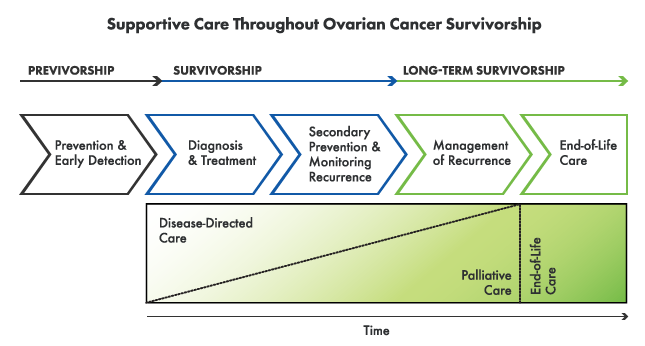
However, most ovarian cancer research focuses on disease treatment rather than on improving the management of acute and long-term physical and psychosocial effects of women with ovarian cancer. More research is needed on how to best support women living with ovarian cancer and improve their quality of life. Research is often insufficiently detailed to distinguish how supportive care needs vary among women with ovarian cancer based on individual characteristics such as age, race, ethnicity, tumor subtype, or point in the cancer care trajectory.
These research gaps may be informed by more effective assessment of patient-reported symptoms and outcomes, including outcomes that are most important for patients (e.g., quality of life). Finally, because many women with ovarian cancer continue active disease-directed treatment until the end of their lives, research could help better define when disease-focused treatments are unlikely to benefit women with ovarian cancer. This knowledge would enable a more timely transition in care to focus on supportive care near the end of life.
RECOMMENDATION 10: Researchers and funding organizations should study the supportive care needs of patients with ovarian cancer throughout the disease trajectory, including:
- Identifying the array of factors that put women at high risk for poor physical and psychosocial outcomes;
- Identifying and overcoming barriers to the systematic assessment of the physical and psychosocial effects of disease and treatment;
- Developing and implementing more effective supportive care and self-management interventions; and
- Defining the parameters that indicate when patients and their families would benefit from transitioning to end-of-life care.
Dissemination and Implementation of Knowledge
The committee concluded that there is a need for research on and development of more effective strategies to disseminate new knowledge about ovarian cancers. Dissemination strategies need to target diverse audiences, so that advances in ovarian cancer research can reach women, their health care providers, advocates, and other stakeholders.
RECOMMENDATION 11: Stakeholders in ovarian cancer research, clinical care, and advocacy should coordinate efforts to develop and implement efficient, effective, and reliable methods for rapid dissemination and implementation of evidence-based information and practices to patients, families, health care providers, advocates, and other relevant parties. These efforts should include
- Researching impediments to adopting current evidence-based practices;
- Using multiple existing dissemination modalities (e.g., continuing education, advocacy efforts) to distribute messages strongly supported by the evidence base and
- Evaluating newer pathways of dissemination and implementation (e.g., social media, telemedicine with specialists).
Conclusion
While progress has been made in understanding ovarian cancers over the past few decades, much remains to be learned, especially about the origins and mechanisms of development—fundamental knowledge that could change paradigms for prevention, screening and early detection, and treatment.
A focus on distinct areas of research within and across the continuum of ovarian cancer care will help improve the lives of all women at risk for or diagnosed with ovarian cancer.
To download a free copy of the report, please visit nationalacademies.org/OvarianCancers.
NATIONALACADEMIES.ORG/OVARIANCANCERS
